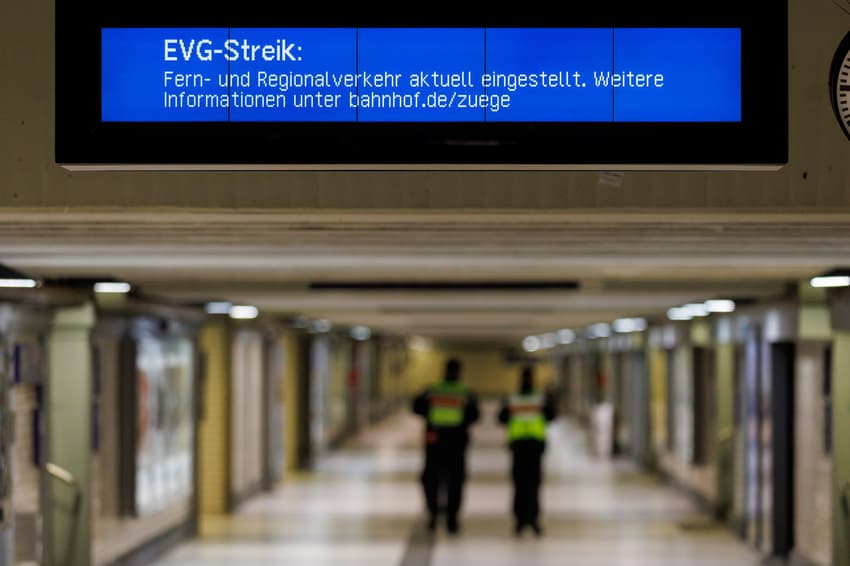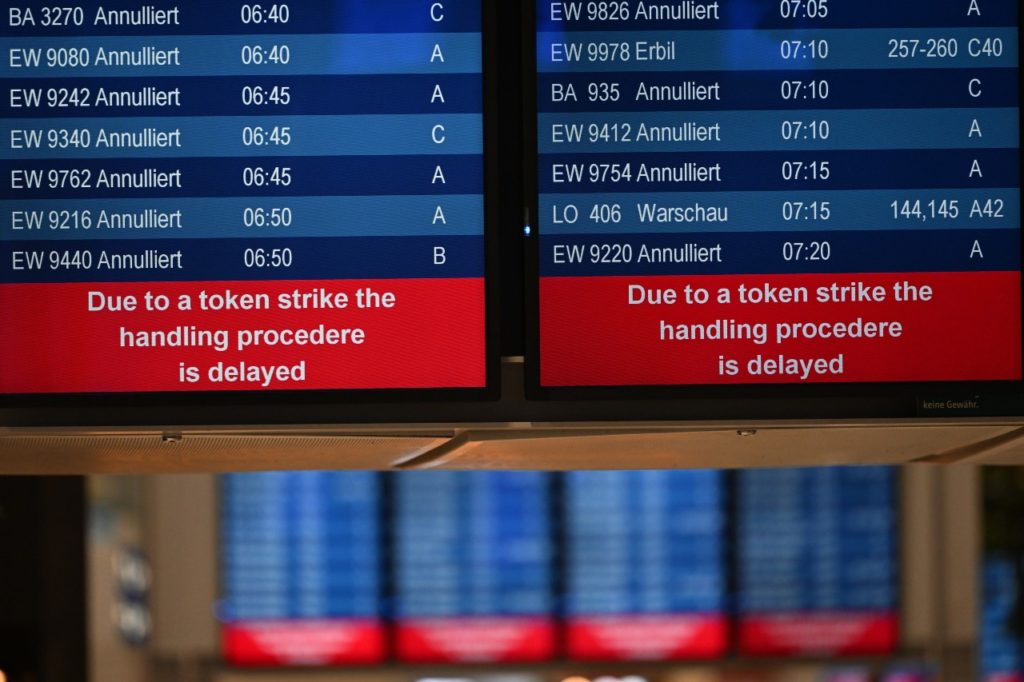UPDATE: What you need to know about Germany’s latest transport strikes

With both Deutsche Bahn and security staff in passenger screening and goods control at four major airports striking at the same time, here’s what you should know about the strikes, alternatives, and potential compensation.
Travellers and commuters around Germany are getting a double whammy this week amidst strikes that have stoked travel chaos.
Passenger screening and goods control security staff at four major German airports – Düsseldorf, Hamburg, Stuttgart, and the Cologne/Bonn joint airport – remain off the job Friday, with three of the four having started striking already on Thursday.
These same security staff also went on strike at Stuttgart Airport beginning on Friday morning. Unlike the other three airports though, they remained on the job on Thursday.
On Friday morning, between 3:00am and 11:00am, the EVG union called for employees at state-owned railway Deutsche Bahn (DB) to go on strike. The call also went out to workers who are members of the EVG union across 50 separate bus and rail companies around the country.
READ ALSO: Deutsche Bahn workers to strike across Germany on Friday
The strikes are part of ongoing disputes between public sector workers, represented by unions like Verdi and EVG, and employers like Deutsche Bahn and German airports, over pay. The unions are looking for wage increases of at least ten percent to help workers deal with soaring inflation and cost of living.
READ ALSO: Travel chaos expected at German airports as security staff plan strike
What exact trains are affected? What alternatives can I use?
DB runs long-distance trains, as well as S-Bahn services and regional trains in Germany. On Friday morning, all of these services were cancelled, with service resuming after 11:00am.
Travellers and commuters should also expect a few backlogs afterward. While local and regional services such as the S-Bahn and regional trains should get up and running fairly quickly, many long-distance trains aren’t likely to start up again until around 1:00pm Friday.
In addition to Deutsche Bahn, around fifty other transport associations have EVG members, who are also likely to strike. Workers with most local transport associations though, including Berlin’s BVG and Munich’s MVV, are not covered under this. That means that while the S-Bahn and regional trains in these cities didn't run during the strike, buses, U-Bahns, and trams remained in service.

Demonstrators from the EVG rail union gather in front of Duisburg Hauptbahnhof during its previous strike in March. Photo: picture alliance/dpa | Christoph Reichwein
Knock-on effects are expected throughout the day on Friday, although a full resolution is expected by the evening. In certain cases of delay, passengers may be entitled to around €80 in compensations – whether for food, new tickets, or accommodation – from Deutsche Bahn.
Passengers are advised to keep all receipts from that day to prove what they’ve spent during the delay.
Passengers are entitled to a full refund if their train is cancelled. They can also claim a 25 percent rebate if their train is over an hour late – and a 50 percent rebate if it is more than two hours late.
READ ALSO:
- EXPLAINED: How to get compensation for delayed or cancelled trains in Germany
- What are my rights if a train is delayed or cancelled in Germany?
What situation can be expected at airports?
Due to the security staff striking, Hamburg Airport cancelled all departing flights from 10:00pm Wednesday to 11:00pm on Friday. Stuttgart has done the same for Friday. Flights may still end up arriving, although even some of these will be cancelled.
It's recommended that passengers of arriving flights check with their airline for more details.
Cologne/Bonn and Düsseldorf airports warned passengers to expect several through the strike days.
Passengers with a flight departing from or travelling to Cologne/Bonn or Düsseldorf are asked to check their flight status regularly. If their flight is going ahead, they’re asked to give themselves extra time as long delays are expected at security screening.

Numerous flights are shown as cancelled on a screen at Düsseldorf Airport. The Verdi trade union has called on its members to stage warning strikes at Hamburg, Cologne/Bonn, and Düsseldorf airports on Thursday and Friday. Photo: picture alliance/dpa | Federico Gambarini
Düsseldorf Airport is also asking passengers with flights that do go ahead to keep their hand luggage to a minimum.
If their flight in cancelled, passengers are asked to contact their airlines directly to make alternative arrangements or arrange compensation.
READ ALSO: What are your rights in Germany if a flight is delayed or cancelled?
When might this end?
Talks are currently ongoing between public sector employers and the EVG transport union, which represents workers with Deutsche Bahn. The next round is expected Tuesday.
Meanwhile, while Verdi represents many workers at German airports, including those striking Friday, an independent arbitration committee has put forward a possible compromise between Verdi and public sector employers.
It’s not year yet though whether the draft deal is enough to satisfy Verdi’s demands, which has not communicated a decision on the offered package.
READ ALSO: Is Germany about to see an end to months of public sector strikes?
Comments
See Also
Travellers and commuters around Germany are getting a double whammy this week amidst strikes that have stoked travel chaos.
Passenger screening and goods control security staff at four major German airports – Düsseldorf, Hamburg, Stuttgart, and the Cologne/Bonn joint airport – remain off the job Friday, with three of the four having started striking already on Thursday.
These same security staff also went on strike at Stuttgart Airport beginning on Friday morning. Unlike the other three airports though, they remained on the job on Thursday.
On Friday morning, between 3:00am and 11:00am, the EVG union called for employees at state-owned railway Deutsche Bahn (DB) to go on strike. The call also went out to workers who are members of the EVG union across 50 separate bus and rail companies around the country.
READ ALSO: Deutsche Bahn workers to strike across Germany on Friday
The strikes are part of ongoing disputes between public sector workers, represented by unions like Verdi and EVG, and employers like Deutsche Bahn and German airports, over pay. The unions are looking for wage increases of at least ten percent to help workers deal with soaring inflation and cost of living.
READ ALSO: Travel chaos expected at German airports as security staff plan strike
What exact trains are affected? What alternatives can I use?
DB runs long-distance trains, as well as S-Bahn services and regional trains in Germany. On Friday morning, all of these services were cancelled, with service resuming after 11:00am.
Travellers and commuters should also expect a few backlogs afterward. While local and regional services such as the S-Bahn and regional trains should get up and running fairly quickly, many long-distance trains aren’t likely to start up again until around 1:00pm Friday.
In addition to Deutsche Bahn, around fifty other transport associations have EVG members, who are also likely to strike. Workers with most local transport associations though, including Berlin’s BVG and Munich’s MVV, are not covered under this. That means that while the S-Bahn and regional trains in these cities didn't run during the strike, buses, U-Bahns, and trams remained in service.

Knock-on effects are expected throughout the day on Friday, although a full resolution is expected by the evening. In certain cases of delay, passengers may be entitled to around €80 in compensations – whether for food, new tickets, or accommodation – from Deutsche Bahn.
Passengers are advised to keep all receipts from that day to prove what they’ve spent during the delay.
Passengers are entitled to a full refund if their train is cancelled. They can also claim a 25 percent rebate if their train is over an hour late – and a 50 percent rebate if it is more than two hours late.
READ ALSO:
- EXPLAINED: How to get compensation for delayed or cancelled trains in Germany
- What are my rights if a train is delayed or cancelled in Germany?
What situation can be expected at airports?
Due to the security staff striking, Hamburg Airport cancelled all departing flights from 10:00pm Wednesday to 11:00pm on Friday. Stuttgart has done the same for Friday. Flights may still end up arriving, although even some of these will be cancelled.
It's recommended that passengers of arriving flights check with their airline for more details.
Cologne/Bonn and Düsseldorf airports warned passengers to expect several through the strike days.
Passengers with a flight departing from or travelling to Cologne/Bonn or Düsseldorf are asked to check their flight status regularly. If their flight is going ahead, they’re asked to give themselves extra time as long delays are expected at security screening.

Düsseldorf Airport is also asking passengers with flights that do go ahead to keep their hand luggage to a minimum.
If their flight in cancelled, passengers are asked to contact their airlines directly to make alternative arrangements or arrange compensation.
READ ALSO: What are your rights in Germany if a flight is delayed or cancelled?
When might this end?
Talks are currently ongoing between public sector employers and the EVG transport union, which represents workers with Deutsche Bahn. The next round is expected Tuesday.
Meanwhile, while Verdi represents many workers at German airports, including those striking Friday, an independent arbitration committee has put forward a possible compromise between Verdi and public sector employers.
It’s not year yet though whether the draft deal is enough to satisfy Verdi’s demands, which has not communicated a decision on the offered package.
READ ALSO: Is Germany about to see an end to months of public sector strikes?
Join the conversation in our comments section below. Share your own views and experience and if you have a question or suggestion for our journalists then email us at [email protected].
Please keep comments civil, constructive and on topic – and make sure to read our terms of use before getting involved.
Please log in here to leave a comment.